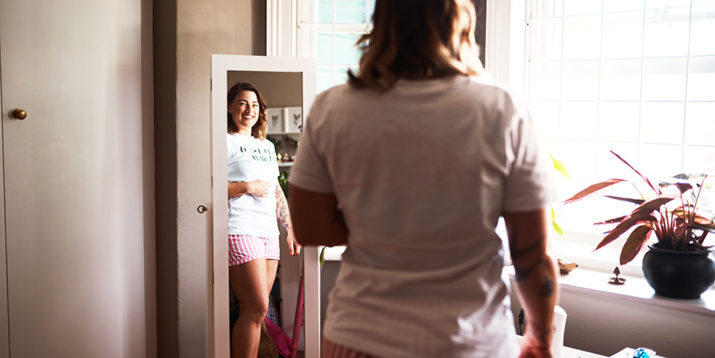How to Foster Body Positivity and Why It Matters

The focus of working out is often on weight and looks, and there’s nothing wrong with that.
However, the non-scale victories and changes you experience mentally and emotionally can be even more powerful than anything that shifts physically.
Being active and moving your body in ways that make you feel good can help cultivate body positivity.
This term gets thrown around a lot these days, and it’s challenging to know what exactly it means.
Read on to learn and also discover ways to help you create a positive body image and, in turn, feel more confident, energetic, and happier.
What Is Body Positivity?
“Body positivity means developing a positive body image and building confidence in one’s body regardless of the pressure of traditional beauty standards of shape, size, or appearance,” explains Lea Lis, M.D., a double board-certified adult and child psychiatrist and assistant clinical professor at New York Medical College.
By rejecting the false idea of a “perfect” body, you realize that all bodies have value and deserve respect.
In turn, you can respond to your body’s needs, treat your body better, and think kindly toward it.
“Body positivity can help reshape one’s relationship with food, exercise, clothing, or health to feel better about their appearance and reject unrealistic standards,” Lis explains.
Why Does Body Positivity Matter?
A positive body image can have a huge effect on our lives mentally and physically.
“Body positivity is just as important as self-esteem. As a matter of fact, it is one huge component of self-esteem and self-worth,” explains Lisa N. Folden, a licensed physical therapist, mom-focused lifestyle coach, and health at every size (HAES) ambassador.
Internalizing negative thoughts about our bodies impacts how we treat ourselves and others, she says.
Body positivity also helps us build resiliency against diet culture, “which constantly bombards us with ideals about beauty and how to achieve it,” says Emily Lauren Dick, a body image activist and author of Body Positive: A Guide to Loving Your Body.
“It’s about learning to challenge what we see in the media and on our feeds, so we can be mentally healthy,” she explains.
7 Ways to Be More Body Positive
1. Move in ways you love
Being active is not just about losing weight or being fit, it’s also about feeling good.
“It helps you feel present in your body and experience life from within your body rather than criticizing your body from the outside looking in,” says Brooke Nicole Smith, Ph.D., a mind and body confidence expert for women entrepreneurs.
“Physical activity can also redefine your priorities. When you fall in love with some form of physical activity — whether it’s walking, yoga, dancing, kayaking, team sports, whatever — you can appreciate the body that lets you do the thing you love to do, regardless of its size or appearance,” she adds.
If you’re looking for a program to help foster body positivity, try LET’S GET UP! with Shaun T.
Each of his 30- to 35-minute workouts combines easy-to-follow dance moves and bodyweight resistance training.
LET’S GET UP! celebrates self-confidence, body positivity, inner strength, and joy for a physical AND mental transformation.
2. Look at your body
Do this often and, ideally, naked, Folden says. Scan yourself over from head to toe.
“By normalizing what you see — rather than avoiding it — you will come to notice the beauty and purpose in your body,” she explains.
3. Curate your social media feeds
Many social media accounts say they’re body positive but in fact, promote a message that tells us our bodies are not good enough and that we would be better off if we changed them, Dick says.
Unfollow anyone who makes you feel bad about your body or who makes you feel like you need to change your body.
(This is different from wanting to change your body for reasons of your own.)
Find accounts that make you feel good.
4. Practice self-care
Whatever this means for you, make time for it. Self-care helps us be more compassionate toward ourselves, Dick says.
“There is no wrong way to practice self-care, as long as it leaves you feeling re-energized and cared for,” she adds.
5. Shut out negative self-talk
Oftentimes we are our own worst enemy, criticizing and beating our bodies up. To help combat this thought process, try using positive affirmations, Folden suggests.
“Repeat them about your body daily until you actually believe them,” she says.
Or make lists of your non-physical achievements to refer to when you start down this negative path, Dick recommends.
“This acts as a reminder that you have more to offer than the way you look,” she says. “You are beautiful — regardless of what society says — but you are also smart, kind, determined, hardworking.”
Feel free to work with a therapist or other mental health professional for additional help with self-talk.
6. Overhaul your closet
“Even if you’re in the process of losing or gaining weight or recovering from a surgery, it is important that you find and wear clothes that fit and compliment your current body,” Folden says.
“Clothes that make you look and feel uncomfortable are a recipe for disaster as it relates to your self-esteem, she adds.
7. Stop “fat talk”
“These statements are normalized conversations that our friends and family partake in, and they are partly why unrealistic ideals are passed down,” Dick says. “They reinforce the idea that fat is something to be feared and hated.”
Rather than saying things like, “I feel fat” or “She’s so much prettier than me,” identify what you’re truly feeling.
For example, “I feel very pressured to look a certain way and I feel ashamed and sad because of that,” she explains.



